Dumped dangerously
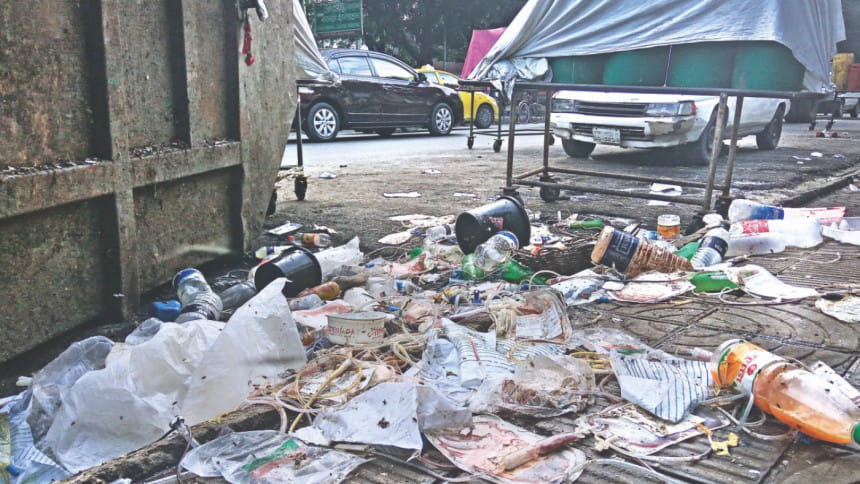
Anyone walking down the street in front of the main entrance to the DMCH emergency unit would encounter an awful sight: used syringes, bandages, dressings, saline bags and many other medical waste littering the pavement.
A heap of such rubbish is also seen in and around two large garbage containers, meant only for regular day-to-day waste.
At times, blood from the bandages and the dressings mix with stagnant rainwater in potholes and gives off foul smell. Flies buzz around the garbage and stray crows and goats scavenge there.
It might sound bizzare but many of the several hundred cleaners working at the country's largest hospital dump such infectious medical waste right into the containers every day, completely ignoring the health hazards. Often, the containers overflow and the entire place is strewn with rubbish.
These waste is kept in the open for hours before ragpickers collect the recycable things, including syringes, saline bags and scalpels from that place. The city corporation authorities take the rest later at night for dumping at a designated site.
Sources at the Dhaka Medical College Hospital said a syndicate of hospital employees direct the cleaners to throw the garbage into those containers. The syndicate members are paid by the ragpickers, who sell the reusuable items to scrap dealers. Later, those items are sold without sterilisation.
Instead of dealing with such infectious waste very carefully, the hospital authorities seem rather nonchalant, putting people's health and the environement in danger.
THE HEALTH HAZARD
Doctors and health experts said dumping such medical waste out in the open could be hazardous for those exposed to them. These waste may spread several contagious diseases, including hepatitis B and hepatitis C, tuberculosis, and malaria. Infected syringes and scalpels could cause fatal diseases like HIV/AIDS.
"Such waste are highly infectious. The germs can travel through the air and such dumping can have serious impact on people's health," Prof Mahmudur Rahman, former director of the Institute of Epidemiology, Disease Control and Research, told The Daily Star recently.
"Those garbage must be handled with extreme caution," he added.
During a visit to the area in front of the hospital gate recently, these correspondents, however, saw 35-year-old ragpicker Abdur Rahman and two of his associates collecting recyclable waste from the trash container with bare hands. They had no masks on.
Later, the three sold some plastic bags to a scrap shop adjacent to the hospital.
Another ragpicker was seen discarding blood from a packet into some stagnant rainwater in a pothole . He was quite casual about the matter.
EMPTY BARRELS
The DMCH has 70 wards and each of the room has barrels of seven different colours meant for different types of waste. For example, general waste has to be dumped in the black barrel and the infectious waste in the yellow barrel.
According to an agreement between the hospital authorities and Prism Bangladesh, a non-government organisation, the barrels, once stuffed, should be put near a hospital room from where the NGO is supposed to transport the garbage to a treatment plant in the capital's Matuail. The DMCH pays Prism Bangladesh Tk 48,000 every month.
The move was taken as part of a project, tiltled Medical Waste Managment Programme, taken up by the undivided Dhaka City Corporation and the NGO in 2005.
The city corporation initiated the project considering the poor management of vast amount to such waste in the city and its subsequent impact on people and the environment. The project covers around 800 more healthcare establishments in the city and Savar, said Mazharul Islam, deputy programme coordinator of the NGO.
Every day, the DMCH treats over 3,700 admitted and several thousand outdoor patients. According to Prism Bangladesh officials, the hospital should be producing at least 1,200kgs of medical waste, which can be divided into infectious, recyclable and sharp wastes.
However, the garbage barrels for Prism Bangladesh put near the hospital room remain almost empty. On the other hand, the cleaners are seen stuffing all sorts of waste in the barrels and keeping them near the large containers for the ragpickers.
On an average, the cleaners, everyday in July, dumped only 2kg of recyclable waste in the barrels meant for Prism Bangladesh , show data from the NGO.
During the same month, Apollo Hospitals gave 153kgs of recyclable garbage, Square Hospital gave 57kgs and United Hospital gave 31kgs of recyclable rubbish to the NGO. The private hospitals treated only 290, 390 and 240 admitted patients every day on average.
The senario is similar in case of the other types of waste, meaning almost all the medical garbage of the DMCH is dumped in and around the two containers near the main gate of the emergency unit.
Prism Bangladesh Foundation officials said the ragpickers also take away a vast amount of the DMCH's infectious medical waste to seperate the recyclable items from them. They said they wrote to the hospital authorities several times but it did not work.
"We wrote to the DMCH authorities several times and informed them about the anomaly, but to no avail," said an official of the NGO, adding that the last letter was sent around a year ago.
The sources in the DMCH said a hospital syndicate, which has eight to ten members, including a leader of the fourth-class employees, two or three ward masters and three to four sweepers, dump several hundred barrels of garbage, mostly the medical waste, in the open through the cleaners.
“The ragpickers share the profit with the syndicate members,” a staff of the hospital told The Daily Star preferring anonymity. He added it also exposed the poor garbage management by the hospital authorities.
Visiting several scrap shops near the hospital, these correspondents saw that each kg of plastic waste was being bought there for Tk 40. For waste like papers it was Tk 4 but it was Tk 120 for old and discarded X-ray films and Tk 30 for sharp wastes.
Talking to The Daily Star, several cleaners claimed they don't get any share in the money, which is taken by the syndinate members and the ragpickers.
"I am asked to dump these garbage here. What else can I do!" said a cleaner, who did not wish to be named.
Contacted, DMCH Director Brig Gen AKM Nasiruddin, who joined office recently, told The Daily Star that the issue had already come to his notice and that they would soon sit with the employees, dealing with the garbage.
Asked, a top DMCH official said they got the latest letter from Prism Bangladesh over a year ago. He said they asked the ward masters repeatedly to ensure that the garbage is not thrown here and there. However, the practice has continued unabated.
Talking to these correspondents, a ward master refuted the existence of the syndicate and claimed that the cleaners dump the waste in the open "only because of ignorance".
He said around 700 cleaners work at the hospital and almost 300 of them are not appointed by the hospital.
"These workers are tipped by the patients and their relatives. The hospital allow them to work due to the dearth of cleaners in comparison to the huge number of patients," said the ward master, claiming that those cleaners "are not properly trained for the dumping."
Talking to this paper several times before, former assistant director (admin) of the hospital Habibur Rahman, who has recently been appointed the civil surgeon of Munshiganj, admitted that they did not stop the "temporary workers" considering the "ground reality" because of the huge number of patients.
SIMILAR SCENARIO
These correspondents saw medical waste dumped near some other public hospitals in the capital, including Pangu Hospital, National Institute of Cardiovascular Diseases and National Institute of Mental Health and National Institute of Kidney Diseases and Urology.
Most of the hospitals do not have any store room for garbage dumping and the cleaners throw away the rubbish carelessly at those spots, said sources at the hospital.
Ragpickers were seen taking away waste from dumps near the hospitals. There was no one to stop them.


 For all latest news, follow The Daily Star's Google News channel.
For all latest news, follow The Daily Star's Google News channel. 

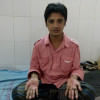
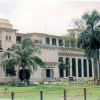
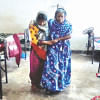
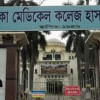
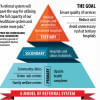


Comments